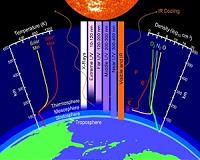 |
Tuscoon AZ (SPX) Jul 19, 2010 Africa faces a mounting number of disasters, such as floods, drought, food security and the spread of diseases, but must also deal with the likely impact of global climate change that could intensify these problems. To help tackle these tragic threats to Africa's human and economic well-being, space-based technologies are being identified. Nearly a 100 decision-makers and senior experts on disaster-risk management from African countries, Europe, the Middle East and America met July 6-9 in Addis Ababa, Ethiopia. This notable gathering of officials was organized by the United Nations Platform for Space-based Information for Disaster Management and Emergency Response, known as UN-SPIDER together with the United Nations Economic Commission for Africa (ECA) with support of the Government of Austria and in cooperation with Secure World Foundation. The UN ECA called for more use of space-based technologies in Africa.
Disasters do not discriminate This event was held as a regional workshop of the UN-SPIDER. The workshop focused on involving Africa more actively and promoting access for African countries to the use of space-based applications and solutions targeting disaster-risk management, emergency response, and climate change and health-related issues. SWF's Lukaszczyk addressed the participants and commented that the Foundation is committed to supporting efforts that lead to sustainable development through the use of space applications. "Modern societies already benefit from services provided by satellites including telecommunications and navigation," Lukaszczyk said. "It is fact that disasters do not discriminate and do not follow political boundaries among countries. There is need to promote cooperation as a cornerstone to promote development." The Addis Ababa workshop brought together authorities on disaster-risk management, drawing upon the expertise from space agencies, remote sensing and mapping agencies responsible for providing space-based technologies and solutions for disaster management support.
Share This Article With Planet Earth
Related Links UN-SPIDER Earth Observation News - Suppiliers, Technology and Application
 A Puzzling Collapse Of Earth's Upper Atmosphere
A Puzzling Collapse Of Earth's Upper AtmosphereHuntsville AL (SPX) Jul 16, 2010 NASA-funded researchers are monitoring a big event in our planet's atmosphere. High above Earth's surface where the atmosphere meets space, a rarefied layer of gas called "the thermosphere" recently collapsed and now is rebounding again. "This is the biggest contraction of the thermosphere in at least 43 years," says John Emmert of the Naval Research Lab, lead author of a paper announcing ... read more |
|
| The content herein, unless otherwise known to be public domain, are Copyright 1995-2010 - SpaceDaily. AFP and UPI Wire Stories are copyright Agence France-Presse and United Press International. ESA Portal Reports are copyright European Space Agency. All NASA sourced material is public domain. Additional copyrights may apply in whole or part to other bona fide parties. Advertising does not imply endorsement,agreement or approval of any opinions, statements or information provided by SpaceDaily on any Web page published or hosted by SpaceDaily. Privacy Statement |